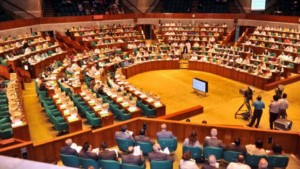Experts at a dialogue on energy sector on Wednesday said though the country’s power generation and supply capacity increased remarkably over the last nine years, its per capita electricity consumption is still the lowest in South Asia and among the developing countries.
They stressed the need for the diversification of energy sources to reduce the use of gas as its reserves are depleting fast.
Policy Research Institute (PRI) in collaboration with Asian Infrastructure Investment Bank (AIIB) arranged the dialogue titled ‘Determining Bangladesh’s energy infrastructure Needs for Today and Tomorrow’ at a city hotel.
Presenting the keynote paper at the programme, PRI executive director Dr Ahsan Mansur said Bangladesh is on the right track to ensure the electricity for cent percent households as the government is planning to increase generation capacity to 22,000MW by FY21.
“However, the major challenges still remain. Despite the impressive growth in power supply, Bangladesh’s per capita electricity consumption remains one of the lowest in South Asia and among the developing countries,” he said.
The energy expert said the country’s gas reserves are alarmingly low and rapidly depleting as it relies on gas for over two-thirds of power generation.
He said though the liquefied natural gas (LNG) import has just started but, it is very costly.
Under the circumstances, he said, much more diversifications of energy sources are crucial to reduce the dependence on gas.
The PRI execute director said the government can import power apart from setting up more coal-based, nuclear and hydro power plants and promoting the renewable energy.
Dr Mansur viewed the average tariff charge by the Bangladesh Power Development Board is still significantly low below the average production cost, leading to higher government subsidy. “Low electricity tariff rates are also impacting negatively on energy efficiency investments.”
Buet Prof and energy expert Dr Mohammad Tamim, said power demand is growing highly in residential sector while it is very low in the industry sector. “So, our policymakers should make projection considering such growth rates.”
He said Bangladesh’s energy sector is facing two major challenges—ensuring affordable and reliable supply of primary energy and financing for different projects.
“According to our government’s plan, around 90 percent of our energy will be imported by 2030. So, we should also think what will be its impact,” the Buet professor said.
Mentioning that the country now import oil worth of Tk 3 billion, he said, “If we import 350 million Cubic Feet gas per day, we’ll have to pay Tk 1.27 billion yearly. “If it’s 1 billion Cubic Feet gas per day, the yearly bill will be 3.56 billion.”
Tamim said the government is talking about generation of 30,000-40,000 MW power. “The cost of 1,000 MW power will be roughly TK 1.4 billion without the cost of supply and distribution. “So, our policymakers should think making plans are easy, but it’s very difficult to get the investment.”
He said the government went for setting up coal-based power plants without making a plan for building coal-import infrastructure. “That’s why there’s no good progress in work on coal-based power plants, except Rampal and Payara ones.”
The expert suggested the government not to give subsidy to CNG, oil and LNG and sell those at international rate.
Prof M Shamsul Alam, energy adviser of the Consumers Association of Bangladesh (CAB), said corruption and lack of accountability in energy sector is a major barrier to ensure affordable power and gas for consumers. “The government needs not to give subsidy to the energy sector, if only corruption can be checked and accountability can be ensured.”
He deplored that the government itself is doing business in the name of service by frequently raising the tariffs of utility services.




